Quality Education for Sustainable Development: A Comparative Study of Public and Private Schools of Pokhara
DOI:
https://doi.org/10.3126/jjis.v12i1.62241Keywords:
Quality education, nation building, parents’ perception, private schools, public schools, schools’ performanceAbstract
This paper aims to explore the performance of two distinctly established education institutions, private and public schools and compare the quality of educational services provided by them in the perception of parents. The study has been carried out using the qualitative research design. With the use of relevant secondary data sourced from relevant literature reviews and official reports, the informants like parents, teachers and school administrators from the purposively sampled schools of Pokhara Metropolitan City Ward no. 13 were taken as the sources of primary data. The analysis of the data followed a dual approach. Initially, responses from the participants were systematically organized and quantitatively summarized. Subsequently, thematic analysis was employed to identify recurring themes and patterns within the qualitative data. This comprehensive analysis aimed to derive meaningful insights and an understanding of the research questions. The study has tried to investigate the reasons behind school’s selection by the parents and to assess whether the deviation in enrollment in private and public schools is due to differences in quality between them. Although, Nepal is among the leading countries in South Asia in term of accessibility to education, there are numerous challenges when it comes to quality. It concludes that private and public schools should not be seen as competitors of each other, rather they should be regarded as the supplements as both of provide equal contribution in education sector of the country.
Downloads
Downloads
Published
How to Cite
Issue
Section
License
Copyright (c) 2023 The Author(s)

This work is licensed under a Creative Commons Attribution-NonCommercial 4.0 International License.




